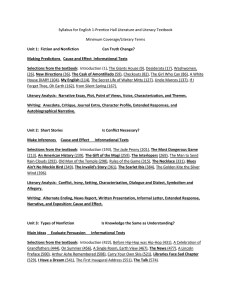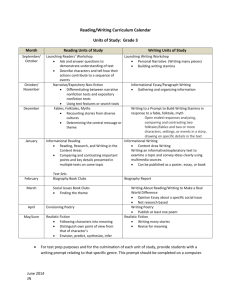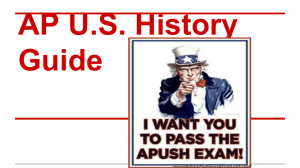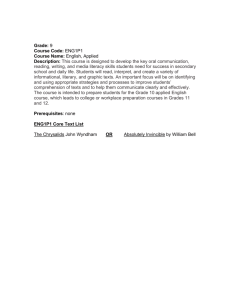Prentice Hall Lesson Plan Outline Unit 1: Fiction and Nonfiction Can
advertisement
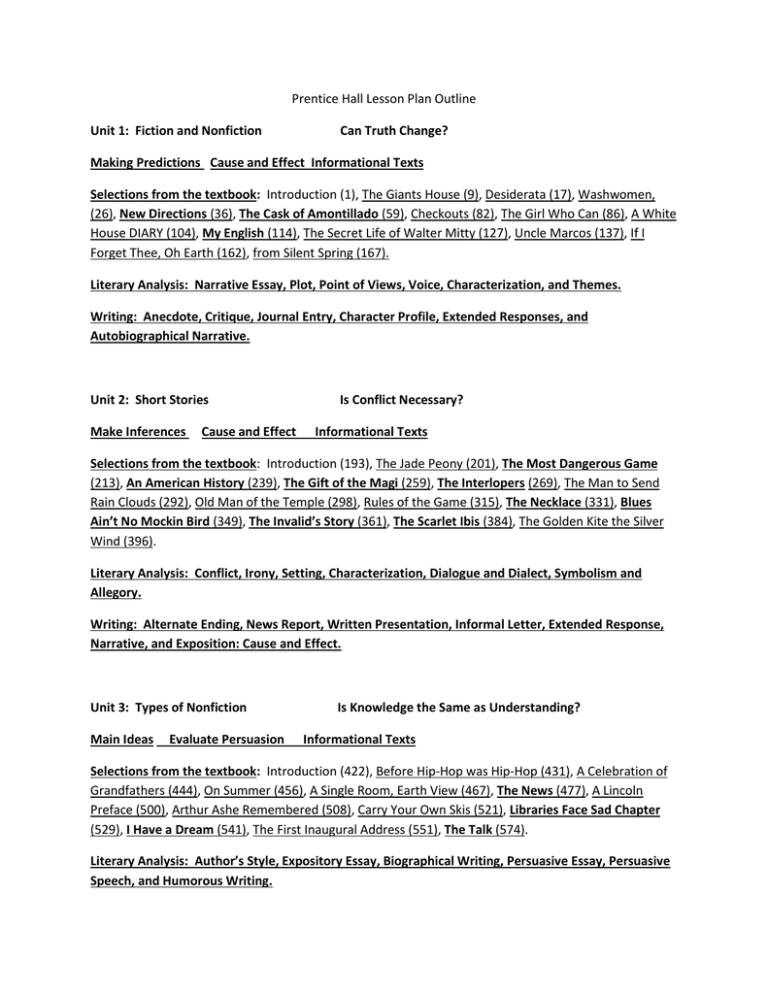
Prentice Hall Lesson Plan Outline Unit 1: Fiction and Nonfiction Can Truth Change? Making Predictions Cause and Effect Informational Texts Selections from the textbook: Introduction (1), The Giants House (9), Desiderata (17), Washwomen, (26), New Directions (36), The Cask of Amontillado (59), Checkouts (82), The Girl Who Can (86), A White House DIARY (104), My English (114), The Secret Life of Walter Mitty (127), Uncle Marcos (137), If I Forget Thee, Oh Earth (162), from Silent Spring (167). Literary Analysis: Narrative Essay, Plot, Point of Views, Voice, Characterization, and Themes. Writing: Anecdote, Critique, Journal Entry, Character Profile, Extended Responses, and Autobiographical Narrative. Unit 2: Short Stories Make Inferences Cause and Effect Is Conflict Necessary? Informational Texts Selections from the textbook: Introduction (193), The Jade Peony (201), The Most Dangerous Game (213), An American History (239), The Gift of the Magi (259), The Interlopers (269), The Man to Send Rain Clouds (292), Old Man of the Temple (298), Rules of the Game (315), The Necklace (331), Blues Ain’t No Mockin Bird (349), The Invalid’s Story (361), The Scarlet Ibis (384), The Golden Kite the Silver Wind (396). Literary Analysis: Conflict, Irony, Setting, Characterization, Dialogue and Dialect, Symbolism and Allegory. Writing: Alternate Ending, News Report, Written Presentation, Informal Letter, Extended Response, Narrative, and Exposition: Cause and Effect. Unit 3: Types of Nonfiction Main Ideas Evaluate Persuasion Is Knowledge the Same as Understanding? Informational Texts Selections from the textbook: Introduction (422), Before Hip-Hop was Hip-Hop (431), A Celebration of Grandfathers (444), On Summer (456), A Single Room, Earth View (467), The News (477), A Lincoln Preface (500), Arthur Ashe Remembered (508), Carry Your Own Skis (521), Libraries Face Sad Chapter (529), I Have a Dream (541), The First Inaugural Address (551), The Talk (574). Literary Analysis: Author’s Style, Expository Essay, Biographical Writing, Persuasive Essay, Persuasive Speech, and Humorous Writing. Writing: Book Jacket Copy, Script, Journal Entry, Abstract, Proposal, Extended Response, Business Letter, and Persuasion: Editorial. Unit 4: Poetry Read Fluently How Does Communication Change Us? Paraphrase Informational Texts Selections from the Textbook: Introduction (602), Uncoiling (611), Voice (613), Dreams (621), I Wandered Lonely as a Cloud (627), All Watched Over by Machines of Loving Grace (632), Hope (634), Much Madness Divinest Sense (635), The War Against the Trees (637), Summer (646), Jabberwocky (662), Daily (679), Hope (680), The Day of the Storm (682), Fifteen (699), The Horses (706), The Writer (708), The Raven (710), The Road Not Taken (725), The Seven Ages of Man (735), Fire and Ice (736), Women (752), Sonnet 30 (754). Literacy Analysis: Figurative Language, Sound Devices, Imagery, Narrative Poetry, Rhyme and Meter, and Poetry. Writing: Descriptive Writing, Editorial, Description of a Scene, Poem, Extended Response, and Responding to Literature. Unit 5: Drama Do Our Differences Define Us? Summarize Draw Conclusions Informational Texts Selections from the Textbook: Introduction (776), Introduction to Shakespeare (802), Romeo and Juliet (806), A Midsummer Night’s Dream (951), The Inspector General (969), The Importance of Being Earnest (988), from Big Kiss (996). Literacy Analysis: Dialogue and Stage Directions, Blank Verse, Dramatic Irony, Tradegy and Motive, Archetype Themes, Comedy, and Satire. Writing: Editorial, Persuasive Letter, Play, Extended Response, and Exposition: How to Essay, Research Report. Unit 6: Heroism Historical Cultural Context Do Heroes have Responsibilities? Comparing and Contrasting Characters Informational Texts Selections from the textbook: Introduction (1026), Play Hard; Play Together; Play Smart (1035), The Odyssey (1043), An Ancient Gesture (1128), Three Skeleton Key (1147), The Red-Headed League (1165), There is a Longing (1195), Glory and Hope (1201), Pecos Bill: The Cyclone (1218), Perseus (1225). Literacy Analysis: Epic Hero, Epic Simile, Interpreting, Protagonist and Antagonist, Philosophical Assumptions, and Comparing Tall Tale and Myth. Writing: Everyday Epic, Biography, Journal Entry, Letter, Extended Response, Technical Document, and Compare and Contrast Essay.
